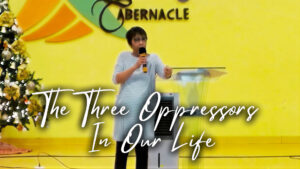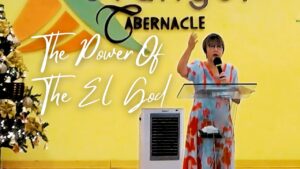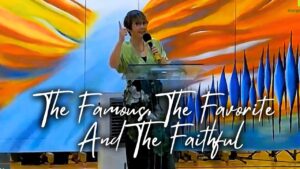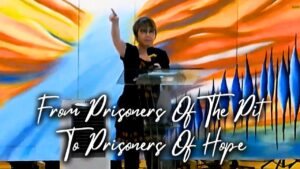Scripture Reading: Psalms 23:4
The late Jack Hyles met a lady on the airplane many years ago. He sat down in a seat next to the aisle. The seat next to him was empty, and a lady was sitting in the next seat (the window seat). She was about Jack Hyles’ age. He exchanged pleasantries with her and then he got out his Bible and began to read. When she saw the Bible, she began to weep. She said nothing for awhile, but when she saw the Bible she began to weep. She said, “Mister, when you get through with that Bible, can I read it?” “Lady, I have two others in my briefcase. You can have one of them.” He took out a Bible and gave it to her. She began to thumb through it. Jack Hyles could tell she couldn’t find what she wanted. He said, “May I help you?” “I want to read the twenty-third Psalm.” Jack said, “Let me read it to you.” So he opened the Bible to Psalm 23 and began to read it, as tears streamed down her face and her lips began to quiver. Jack said, “You have a broken heart, don’t you?” She said, “Yes, my father is dying in Houston, Texas. I don’t know if I will get there before he dies. I love the twenty-third Psalm.” In just a few moments, he told her about the Shepherd of that Psalm, and she received Him as her Saviour. I guess of all the passages of the Bible that have comforted the hearts of troubled souls, strengthened the backs of weary travellers and encouraged the spirits of broken hearts, Psalms 23 is one of the most mentioned. Psalms 23 talks about the valley of our life. In Psalms 23:4, David speaks of a deep, dark valley where there seems to be no ray of light and you feel like you are not going to make it. But, valleys are not dead-end streets and the disappointments, frustrations, discouragements, and dilemmas of life although they are valleys, shouldn’t be classified as a disaster. David even refers to them as a shadow.
Dictionary.com defines Valley as an elongated depression between hills or mountain, especially one following the course of a stream. It is an extensive, more or less flat land, and in a relatively low region. Dictionary.com also defines valley in the figurative sense as life’s low point; any period, or situation that is filled with fear, gloom, foreboding. The Vines Dictionary denotes it as “a ravine or valley,” as condition of loneliness and danger. It is eye opening to note that the land of Israel which belongs to the people of God is filled with numerous valleys. Valleys are part of our lives. This morning I want to talk about the valleys of our lives. Valleys not only characterize the landscape of Israel, but become prominent features in the biblical narrative, whether used literally or in a literary figure. Various valleys are mentioned in the bible with thought-provoking names given to them. Let’s study them and learn how it applies to our life.
1. The Valley of Jehoshaphat
Joel 3:12-14 says, ‘Let the heathen be wakened, and come up to the valley of Jehoshaphat: for there will I sit to judge all the heathen round about. Put ye in the sickle, for the harvest is ripe: come, get you down; for the press is full, the fats overflow; for their wickedness is great. Multitudes, multitudes in the valley of decision: for the day of the Lord is near in the valley of decision.’
It is not surprising that a significant battle to be fought in eschatological times will occur in a valley. My purpose in quoting Joel 3:12-14 is not to discuss about the end times but because the Valley of Jehoshaphat is mentioned. Suffice to say is that the Valley of Jehoshaphat represents scenes of battles in life which are many and varied. The Valley represents scenes of battles in our life and they are many and varied. I look at my life. I have fought many battles; battles involving this church, battles outside of this church, battles within my family and battles within myself. Oh they are many and varied. And they have left an indelible mark in my soul. I don’t think I will ever forget a number of them. A similar incident during the time of Jehoshaphat took place and that is where I believe the Valley of Jehoshaphat came about.
Jehoshaphat was one of the better Kings of Judah. The story of Jehoshaphat can be found in Kings and Chronicles. He glows with his devotion to the LORD. He never participated in the prominent Baal cult or other idol based religions that had ensnared Israel and Judah. He removed Asherah shrines. Yet Jehoshaphat was an imperfect King. His biggest weakness was his habit of forming alliances with evil men. First with Israel King Ahab, then later with Ahab’s son Ahaziah and finally with Ahab’s son King Jehoram. He was pious but lacks discernment. In spite of all these evil alliances, when in fear he sought the LORD. He made mistakes. But he always knew he could go to God which was important. The same should go with our life. In Spiritual battle, it is always good to search and seek God. Which is what Jehoshaphat did. And God always spoke to Jehoshaphat when he seeks God. Sometimes we don’t’ always have the answer but he is always there. Even in our mistakes of making alliances with enemies God tells us it is still his battle. God doesn’t ignore what happens to us. A Spiritual life is important at this time. And a Spiritual life is not always being religious, e.g. going to church. I think 80 percent of Filipinos goes to church every Sunday. So I would say that they are religious. But do they have a relationship with God? No. Are they spiritual? No. It is more of a relationship with God. When you have a spiritual life, adversity causes us to be calm and at peace. It causes us to have faith and do the right thing. You may know that you made a mistake. But you still turn to God. That is what happens to Jehoshaphat. But let’s get back to understanding the Valley of Jehoshaphat.
Please understand that Jehoshaphat was always about the work of God. We must always be about the work of God. In fact verse 1 of 2 Chronicles 20 says ‘After this?’ After the events of chapter 19, when he was involved in the work of God came the invasion. The attack. It is so ironical that many times when we are in the midst of doing some breakthrough for God, attacks come. When we wanted to introduce the Rodney Howard Browne Revival, the attack came. When we wanted to introduce the G12, the attack came. When we wanted to move into this building, the attack came. In the midst of service to God, a huge army from across the Dead Sea declared war on Judah. Jehoshaphat was justifiably alarmed. 2 Chronicles 20:1-2 says ‘It came to pass after this also, that the children of Moab, and the children of Ammon, and with them other beside the Ammonites, came against Jehoshaphat to battle. Then there came some that told Jehoshaphat, saying, There cometh a great multitude against thee from beyond the sea on this side Syria; and, behold, they be in Hazazontamar, which is Engedi.’ The enemies are represented as a coalition of ‘Moab’, ‘Ammon,’ and ‘Meunities’. They launched an attack on Jehoshaphat from across the Jordan. The Meunites were an Arabian tribe living in Edom from Mount Seir and elsewhere east and south of the Dead Sea. We know that Moab and Ammon are descendant of Lot which is today Jordan and Meunities are descendants of Esau and their specific location is the Rock of Petra near the Dead Sea. Jehoshaphat learned that this great host was already at Hazazon Tamar, on the west shore of the Dead Sea, and would soon head for Jerusalem. They were gathered at this place, which is called the Valley of Jehoshaphat. Immediately Jehoshaphat proclaimed a fast and called the people to the temple, where he prayed to the Lord. Jehoshaphat reminded the Lord that the Jews were His covenant people. The temple, where Jehoshaphat was praying, was God’s sanctuary and the place where He promised to hear and answer prayer, and the land that the enemies wanted to take belongs to Israel because God has given it to them for their inheritance. Also the Ammonites, Moabites and Meunities were those to whom Israel had once shown kindness were now coming to destroy her and take away her land.
Jehoshaphat then led the singers the way to the conflict in the Desert of Tekoa near the Valley of Jehoshaphat. The singers inspired the people with their words of encouragement to trust the Lord. 2 Chronicles 20:22-24 ‘And when they began to sing and to praise, the Lord set ambushments against the children of Ammon, Moab, and mount Seir, which were come against Judah; and they were smitten. For the children of Ammon and Moab stood up against the inhabitants of mount Seir, utterly to slay and destroy them: and when they had made an end of the inhabitants of Seir, every one helped to destroy another. And when Judah came toward the watch tower in the wilderness, they looked unto the multitude, and, behold, they were dead bodies fallen to the earth, and none escaped.’ You see, God caused such confusion among the enemy troops that they turned on one another. The Ammonites and the Moabites fought against the Meunites until the latter were annihilated, and after that the Ammonites fought against the Moabites. Jehoshaphat and his people found only a slain host, from which they secured immense and valuable booty requiring three days for its gathering. 2 Chronicles 20:25-26 ‘And when Jehoshaphat and his people came to take away the spoil of them, they found among them in abundance both riches with the dead bodies, and precious jewels, which they stripped off for themselves, more than they could carry away: and they were three days in gathering of the spoil. It was so much. The explanation is that the booties is in such abundance that it could not be carried away, removed, and plundered in three days, because the booty was so great. The unusually large quantity of booty is accounted for by the fact that these peoples had gone forth with all their property to drive the Israelites out of their inheritance, and to take possession of their land for themselves; so that this invasion of Judah was a kind of migration of the peoples. Our enemies always wanted to take away our inheritance and they want to remove us and take what rightfully belongs to us. And on the fourth day they assembled themselves in the valley of Berachah; for there they blessed the Lord: therefore the name of the same place was called, The valley of Berachah, unto this day. The Valley of Beracah is not far from the battlefield. Out of any spiritual battles of our life, is the Valley of Beracah. Beracah means blessings. Blessings awaiting us. Blessings of God are always near battle scenes of our lives. Commentators tell us that the Valley of Beracah, a literal place, west of Tekoa, is a wide, open valley which covers from three to four acres. The Valley of Blessings is always wide and open. This is where names becomes very interesting. Jehoshaphat means ‘Yahweh will judge.’ So the Valley of Jehoshaphat is called the Valley of Judgment. Yahweh will be our judge and will judge for us. After God has finished his judgment, he will distribute gifts for us. The Hebrew word berachah (“blessing”) is used some 68 times in the Old Testament, the first being God’s promise to Abraham, when he followed the Lord: “And I will make of thee a great nation, and I will bless thee, and make thy name great; and thou shalt be a blessing” (Genesis 12:2). Beracah means resources or blessings. God turns the Valley of Jehoshaphat into a Valley of Great Resources and Blessings. When you go through Valley of Jehoshaphat, valleys of Judgment, seek and search out God. Don’t lose your faith in God. Release a spirit of high worship unto God. The battle is not yours but God’s. Out of the Valley of judgment will come forth the Valley of Beracah, great resources and blessings will flow out of that valley.
2. The Valley of Baca
Psalm 84:5-8 ‘Blessed are the men whose strength is in thee, in whose heart are the highways to Zion. As they go through the valley of Baca they make it a place of springs; the early rain also covers it with pools. They go from strength to strength; the God of gods will be seen in Zion. O Lord God of hosts, hear my prayer; give ear, O God of Jacob!’
The Valley of Baca refer to a parched place with a kind of tree. In the encyclopaedia of the Bible, the mulberry tree is called ‘Baka.’ I know in the Revised Version, the Mulberry tree is also known as the Balsam Tree. “Baca’ is spelled differently in the Hebrew. To understand why the mulberry tree is found in the Valley of Baca (mulberry), we need to turn to 1 Chronicles 14:13-17 where it says, ‘And the Philistines yet again spread themselves abroad in the valley. Therefore David enquired again of God; and God said unto him, Go not up after them; turn away from them, and come upon them over against the mulberry trees. And it shall be, when thou shalt hear a sound of going in the tops of the mulberry trees, that then thou shalt go out to battle: for God is gone forth before thee to smite the host of the Philistines. David therefore did as God commanded him: and they smote the host of the Philistines from Gibeon even to Gazer. And the fame of David went out into all lands; and the Lord brought the fear of him upon all nations.
In David’s time, there was a valley filled with Mulberry trees and I supposed it is called the Valley of Baca. Mulberry or Baca means bitter. And ‘Baca does sound like weeping. So traditionally the Valley of Baca has been understood as the ‘Valley of Weeping’ because of the bitterness of life. You must understand that Psalms 84 was addressing two groups of people. One that God will use to minister to those in the Valley of Baca and another you yourself in the Valley of baca.
The first refers to the ministry that men and women who know how to make a highway for God impact the lives of others. They will come to those in the place of sorrowing, of despair, of discouragement, and because they know the highway of God, and by their radiant faith and their cheerful outlook, turn other’s valley into a place of fountains, of refreshment, of satisfaction. They will do it by means of the Holy Spirit. The early rain is a picture of the Holy Spirit.
A Pastor had a special speaker by the name of Dr Mitchell one Sunday service. He relates; ‘There was present here last Sunday a young man in both morning and evening services who had been struggling with some very difficult problems in his life. He had come under an awful load of defeat and depression. In the morning service, he was so held by what Dr. Mitchell said, that he came back for the evening service. Those of you who were with us may remember that Dr. Mitchell brought forth most beautifully the forgiveness of God, and how the grace of God sets us free. This young man sat in the second row, his face fastened on Dr. Mitchell, listening and drinking in every word. At the end of the service he said to one of his friends, “What a burden of guilt has been lifted from my life!” The following Tuesday, he met with Dave Roper (church leader) at noon to have lunch together and talk over his difficulties. As they were riding in Dave’s Volkswagen, they stopped at a red light. They were engrossed in their talk when around the corner — and through a red light — came a huge, loaded, moving van. It hit the front of the Dave’s Volkswagen, drove it under the truck, the door on the right side opened up, and the young man fell out and was instantly killed. Dave was left unhurt, with hardly a scratch.
It was a shocking thing to him, and to us, for our staff had been praying for that young man just that morning. When Dave came back, he said, “The boy we prayed for this morning is dead.” Though we were shaken and shocked by what happened, I couldn’t help but think of the comfort that had been brought him as Dr. Mitchell had passed through his valley of Baca and had made it a place of springs instead of tears. What a ministry that is.
The second group of people is we ourselves in the Valley of Baca. Valley of Baca means pour out your tears. Just yesterday, Pastor Lily and I went to two funeral wake. Both are young. One is in her 20s and another in her 40s. There are tears in many eyes today, sobs in many throats and aches in many hearts. This passage in Psalms tells us what to do as we pass through the valley of weeping, make it a well. Baca means weeping. God promises us that, “Weeping may endure for a night but joy cometh in the morning.” (Psalms 30:5) He also tells us in Psalms 116:8 “For thou hast delivered my soul from death, mine eyes from tears, and my feet from falling.” Are you discouraged? Is the battle too great and difficult for you? Are you buried under many things today? Is the temptation so hard that you feel like giving up? Are the shadows so heavy that you cannot see through and the reaping so distant that you have lost hope? Look to Jesus, my friend, let Him undertake for you and your valley of weeping will become a well, a well full of living water: you may quench your own thirst there. The valley of Weeping” is any period of loss, sorrow, grief, deprivation, or disaster through which God’s child must pass during his earthly sojourn; and the glory of God’s service is that it enables the worshipper to change even sorrows into springs of praise and thanksgiving. The rains mentioned in the same context are a reference to God’s blessing upon those who suffer.
3. The Valley of Achor
Achor is the valley of punishment. Anchor is the valley where Achan was stoned to death. The Lord said, “Do not take anything that is in Jericho.” Achan saw a coat and said, “My wife sure would like to have that coat.” The Lord said not to take anything. He knew he shouldn’t. Achan saw $185 and said, “I sure could use that.” Achan took the money and the coat, and sin came into the camp. Then the battle of Ai was lost. Joshua called all the people and cast lots. The lot fell on Achan. God said, “Take him out to the valley and stone him to death.” They stoned Achan and his wife and his children. They named that place the valley of Achor (the valley of chastening).
You know, one of the sweetest things about being a Christian is getting spanked. A minister shared this: ‘When I was a child my mother spanked me. She and I lived alone. Earlyne, eight years older than I, was married, so she moved away. My dad had left home. Mother and I were left together. If Mother had turned her back on me, there wasn’t anybody else! We were very poor. I can recall when Mother would spank me. The spanking hurt, but it did not hurt the most. The thing that hurt the most was the broken fellowship. She would spank me and put me in the back bedroom on my bed, and I would cry. Then she would pull the door shut like she was gone. I thought mother was gone! I began to tip-toe (She told me not to get up, but since I thought she was gone, she wouldn’t know that I was up) to look for Mother. When I could see her, I would say to myself, “She’s still here!”
Even in the valley of chastening, the Lord is still there. He has to spank us, doesn’t He? He has to take the rod of chastening and put it across our backs, but even when God has had to put us in the valley of chastening, spank us, put is in the hospital, cause us to lose a job, put us in the middle of a road in an automobile accident, or knock us down and spank us, it is always blessed because even in the valley of chastening, God is there!
But in addition to a valley as a scene of judgment, beyond that very judgment lies a promise of renewed fertility or vitality. The Valley of Achor, therefore, was a scene of judgment. Nevertheless, in a future day that place of Israel’s sin will experience a transformation. In a time of a purified, revitalized, and restored Israel God will bring renewal to the land. Using the imagery of marriage Hosea prophesies that God will “lead her back to the wilderness. From there I will give back her vineyards to her, and turn the ‘Valley of Trouble’ into an ‘Opportunity for Hope.’… At that time, declares the LORD, you will call, ‘My Husband’; you will never again call me, ‘My master’” (Hos. 2:14b-15, 16). Places such as Achor, which were scenes of Israel’s sin and punishment, will flourish once again due to God’s blessing. For in God’s mercy and grace a repentant and God-fearing Israel will be restored to her land. Judgment will be swallowed up in hope. You said, Pastor, don’t anyhow quote scripture. Where is the proof that The Valley of Achor will be a Valley of hope in the future? Isaiah 65:10 And Sharon shall be a fold of flocks, and the valley of Achor a place for the herds to lie down in, for my people that have sought me.





